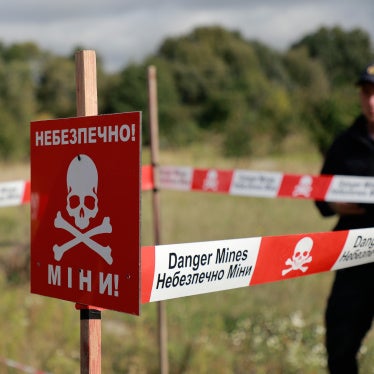Recent scandals involving the supply of weapons from Central and Eastern Europe to Iraq and Liberia, in violation of mandatory United Nations embargoes, make clear that a number of governments in the region do not exercise reliable control on the weapons trade. The problem is widespread and encompasses countries that joined the North Atlantic Treaty Organization (NATO) in 1999, are top candidates for NATO membership this year, or are seeking improved relations with NATO. We feel that the upcoming NATO summit in Prague, Czech Republic, provides an opportunity for NATO to address the urgent need to improve arms trade controls in Central and Eastern Europe. Weak arms trade controls in Central and Eastern Europe are responsible for a number of serious problems. Key concerns include:
- Illicit arms trafficking: too often, arms traffickers are able to bypass lax laws to supply weapons to illegal destinations.
- The glut of surplus weapons: governments continue to sell surplus weapons from their arsenals to trouble spots around the globe.
- Irresponsible authorized arms exports: governments continue to export arms to destinations where the weapons risk fueling human rights abuses and armed conflict.
A fourth key concern, lack of transparency, cuts across these issue areas.
In our view NATO has an important responsibility to assess the progress of partner countries and new allies in controlling arms transfers, to identify areas needing further improvement, and to promote needed changes. To contribute to such measures, we have prepared a brief overview of our recent research findings on arms export issues, covering developments over the past year in several Central and Eastern European countries that have or are seeking membership in NATO. The document also highlights our recommendations for action. The briefing paper, which we will forward to you under separate cover, is available at https://www.hrw.org/backgrounder/arms/nato1115-bck.htm.
As noted in that document, in recent months there have been some positive developments and an overall increased level of attention in Central and Eastern Europe to the need to tighten arms trade controls. NATO and its member states, through dialogue and assistance to candidate countries and other partners, have contributed to this momentum toward reform. We are troubled, however, that irresponsible and illegal arms trading continues, as documented with scores of examples in the briefing paper. We feel strongly that these merit further attention, including after enlargement decisions are finalized and new members begin to be integrated into NATO.
We hope that your government will take the opportunity to engage with NATO allies, candidate countries, and other partners about these pressing issues and work to secure needed improvements. In particular, we hope NATO and its member states will:
- Make clear that responsible arms trading practices, including strict arms trade controls and the disposal of surplus weapons in conformity with human rights criteria, are a requirement for membership and the minimum standard expected of future NATO members.
- Promote the harmonization of arms trade controls within NATO to the highest possible standard and actively encourage candidate countries and future members to undertake needed reforms to meet those standards.
- Take steps to facilitate the progress of candidate countries and future members, including in the form of practical assistance directed to improving legal controls and law enforcement capacity and efforts to enhance information sharing.
- Provide incentives, including financial assistance, for the responsible disposal (for example, through destruction) of surplus military equipment held by candidate countries and future members.
- Make the transfer of newer military equipment from NATO member states to candidate countries and future members contingent on the recipient country's responsible disposal of quantities of surplus weapons.
- Ensure that efforts to address the glut of surplus weapons in Central and Eastern Europe target heavy conventional weapons systems as well as small arms and light weapons.
We appreciate your attention to our concerns and look forward to continued dialogue with you.
Sincerely,
|
/s/ |
/s/ |
Cc: Secretary General Lord George Robertson







